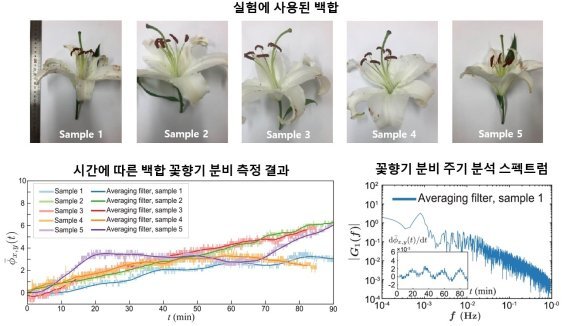
Experimental results showing flower scent emission. (KAIST)
Researchers at the Korea Advanced Institute of Science and Technology said they succeeded in real-time visualization and measurement of floral scent emission for the first time in the world.
Using optical interferometry, research teams led by mechanical engineering professor Kim Hyoung-soo and biological sciences professor Kim Sang-gyu measured the frequency with which lily flowers emit scents.
Floral scent sampling methods using gas chromatography-mass spectrometry have been used to measure the quality and quantity of floral volatiles, but they revealed little about the emission patterns of floral scents.
“By analyzing the refractive index difference between volatile organic compounds and ambient air, we were able to visualize the accumulation of volatile vapors,” the scientists wrote in their research article titled “Real-time Visualization of Scent Accumulation Reveals the Frequency of Floral Scent Emissions.” The article was published in the April issue of Frontiers in Plant Science.
“Based on these real-time measurements, we found that lily flowers emit volatile compounds discontinuously, with pulses observed around every 10-50 minutes,” the scientists wrote in the article.
The technology they developed to observe the floral scent emission patterns will be used to identify the genes involved in the biosynthesis and emission of floral volatiles, as well as in research on the evolution of floral scent compounds through interactions with pollinators, KAIST said in a press release.
If one could control the floral scent emissions, it would help enhance horticultural and agricultural production, the release added.
“If the technology that visualizes vapors or gas in air can be further developed, we would be able to see how much hazardous noxious substances exist in a certain space, and the technology can be expanded for industrial or military purposes,” professor Kim said in the press release.
By Kim So-hyun (sophie@heraldcorp.com)






